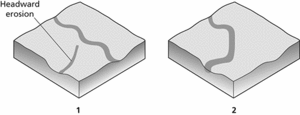Any of various processes in which a system of particles absorbs an extra particle. There are several examples in atomic and nuclear physics. For instance, a positive ion may capture an electron to give a neutral atom or molecule. Similarly, a neutral atom or molecule capturing an electron becomes a negative ion. An atomic nucleus may capture a neutron to produce a different (often unstable) nucleus. Another type of nuclear capture is the process in which the nucleus of an atom absorbs an electron from the innermost orbit (the K shell) to transform into a different nucleus. In this process (called K capture) the atom is left in an excited state and generally decays by emission of an X-ray photon.
Radiative capture is any such process in which the capture results in an excited state that decays by emission of photons. A common example is neutron capture to yield an excited nucleus, which decays by emission of a gamma ray.
Any of various processes in which a system of particles absorbs an extra particle. There are several examples in atomic and nuclear physics. For instance, a positive ion may capture an electron to give a neutral atom or molecule. Similarly, a neutral atom or molecule capturing an electron becomes a negative ion. An atomic nucleus may capture a neutron to produce a different (often unstable) nucleus. Another type of nuclear capture is the process in which the nucleus of an atom absorbs an electron from the innermost orbit (the K shell) to transform into a different nucleus. In this process (called K capture) the atom is left in an excited state and generally decays by emission of an X-ray photon.
Radiative capture is any such process in which the capture results in an excited state that decays by emission of photons. A common example is neutron capture to yield an excited nucleus, which decays by emission of a gamma ray.
1. Substitution in a crystal lattice of a trace element for a common element with lower valency or larger ionic radius, e.g. Ba++ for K+. There is often a higher concentration of captured trace elements relative to common elements in the mineral than in the liquid from which it crystallized. Compare camouflage.
2. See river capture.
When a river is extending its channel upstream by headward erosion, it may come into contact with the headwaters of a less vigorous river. The headwaters from the minor river may be diverted into the more rapidly eroding channel. There is often a sudden change of stream direction at the point of capture; this is the elbow of capture. See Mather (2000) Geomorph. 34, 3 for two examples of river capture; see also Bishop (1995) PPG 19.

River capture
- steinkern
- Steinmann trinity
- Stein method
- Stein, William Howard
- STEL
- stele
- Stella
- stellar association
- stellar atmosphere
- stellar evolution
- stellar interferometer
- stellar population
- stellar structure
- stellar wind
- stem
- stem and leaf diagram
- stem-and-leaf plot
- stem cell
- stem flow
- stem group
- stemmer
- stemming
- stem reptiles
- stenching
- Stenian